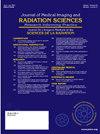Coronary CT Angiography Applications with photon-counting CT
IF 1.3
Q3 RADIOLOGY, NUCLEAR MEDICINE & MEDICAL IMAGING
Journal of Medical Imaging and Radiation Sciences
Pub Date : 2024-10-01
DOI:10.1016/j.jmir.2024.101483
引用次数: 0
Abstract
The first photon-counting computed tomography (PCCT) was installed in Hong Kong in December 2023. I would like to discuss the background and clinical uses of quantum technology in PCCT for coronary angiography. The photon-counting detector is a new, advanced technology that uses detectors that discriminate the energy of individual photons in the x-ray beam and convert the detected individual photons into electric signals. By comparison with traditional CT (energy-integrating detector CT, EID-CT), it offers multiple advantages over standard energy-integrating detectors, including uniform photon weighting across multiple x-ray energies. 10 clinical cases of the patients were compared using PCCT and EID-CT, regarding the image quality of proximal, middle, and distal vessels, calcified plaque, stents, non-calcified plaque, and artefacts of pericardial calcification. The coronary stents and calcified plaque can be assessed by the special features of true-lumen that allow for calcium removal based on material decomposition. The ultra-high-resolution scanning protocol has advantages in demonstrating the in-stent lumen of coronary arteries. Mono-energetic images improve the diagnostic value of cardiac CT angiography. This new technology promises to overcome the blooming artefacts of heavy calcified coronary plaques or beam-hardening artefacts in patients with coronary stents. PCCT enables improved image quality and diagnostic confidence for coronary CT angiography examinations in comparison to EID-CT.
使用光子计数 CT 的冠状动脉 CT 血管造影应用
首台光子计数计算机断层扫描(PCCT)于 2023 年 12 月在香港安装。我想谈谈量子技术用于冠状动脉造影的背景和临床应用。光子计数探测器是一种先进的新技术,它使用的探测器可以分辨 X 射线束中单个光子的能量,并将检测到的单个光子转换为电信号。与传统的 CT(能量积分探测器 CT,EID-CT)相比,它具有标准能量积分探测器的多种优势,包括对多种 X 射线能量进行统一的光子加权。我们使用 PCCT 和 EID-CT 对 10 例临床患者的近端、中间和远端血管、钙化斑块、支架、非钙化斑块和心包钙化伪影的图像质量进行了比较。冠状动脉支架和钙化斑块可通过真腔的特殊功能进行评估,该功能可根据材料分解情况去除钙质。超高分辨率扫描方案在显示冠状动脉支架内腔方面具有优势。单能量图像提高了心脏 CT 血管造影的诊断价值。这项新技术有望克服重度钙化冠状动脉斑块的花斑伪影或冠状动脉支架患者的束流硬化伪影。与 EID-CT 相比,PCCT 可提高冠状动脉 CT 血管造影检查的图像质量和诊断信心。
本文章由计算机程序翻译,如有差异,请以英文原文为准。
求助全文
约1分钟内获得全文
求助全文
来源期刊

Journal of Medical Imaging and Radiation Sciences
RADIOLOGY, NUCLEAR MEDICINE & MEDICAL IMAGING-
CiteScore
2.30
自引率
11.10%
发文量
231
审稿时长
53 days
期刊介绍:
Journal of Medical Imaging and Radiation Sciences is the official peer-reviewed journal of the Canadian Association of Medical Radiation Technologists. This journal is published four times a year and is circulated to approximately 11,000 medical radiation technologists, libraries and radiology departments throughout Canada, the United States and overseas. The Journal publishes articles on recent research, new technology and techniques, professional practices, technologists viewpoints as well as relevant book reviews.
 求助内容:
求助内容: 应助结果提醒方式:
应助结果提醒方式:


